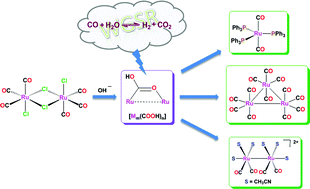Hydroxycarbonyl complexes as key intermediates in the base-assisted reduction of ruthenium carbonyls†
Abstract
Since the recognition of metal-

* Corresponding authors
a
Department of Chemistry, Indian Institute of Technology Kanpur, Kanpur, India
E-mail:
jbera@iitk.ac.in
Fax: +91-5122597436
Tel: +91-5122597336
Since the recognition of metal-

 Please wait while we load your content...
Something went wrong. Try again?
Please wait while we load your content...
Something went wrong. Try again?
A. Sinha, T. Ghatak and J. K. Bera, Dalton Trans., 2010, 39, 11301 DOI: 10.1039/C0DT00679C
To request permission to reproduce material from this article, please go to the Copyright Clearance Center request page.
If you are an author contributing to an RSC publication, you do not need to request permission provided correct acknowledgement is given.
If you are the author of this article, you do not need to request permission to reproduce figures and diagrams provided correct acknowledgement is given. If you want to reproduce the whole article in a third-party publication (excluding your thesis/dissertation for which permission is not required) please go to the Copyright Clearance Center request page.
Read more about how to correctly acknowledge RSC content.
 Fetching data from CrossRef.
Fetching data from CrossRef.
This may take some time to load.
Loading related content
